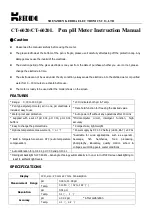
Power Sweep Not Functioning Properly
Power sweep is accomplished by stepping Real Time Dac
(R/T
which adds an
offset to the POWER LVL signal. Refer to Function Block S of Al4 Frequency Control
Assembly schematic. R/T
is an
dac and can provide power sweeps of up to
12.8
This is equivalent to 0.05
per dac step. Since R/T
has only 256 discrete
settings but 601 points per sweep are digitized, up to three adjacent points per sweep may
correspond to the same power level setting.
1. If the power sweep appears to be non-monotonic, the fault probably lies on the A3
Interface Assembly (Real Time
To check the operation of R/T
monitor
pin 3 with an oscilloscope. Trigger the oscilloscope off the negative-going edge of
the BLANKING output of the HP 8560A. Set the POWER SWEEP RANGE to 12.8
and TRK GEN RF POWER to -10
Set the HP 8560A SWEEPTIME to 50 ms. A 0
to
V ramp should be observed on the oscilloscope. The amplitude of the ramp should
decrease approximately 780
for each 1
decrease in POWER SWEEP RANGE.
Note
Although POWER SWEEP RANGE may be set to a 12.8
sweep width,
the POWER SWEEP function is only warranted to have a 10
sweep width.
2. Perform the Vernier Accuracy Performance Test. If this test fails, refer to Vernier Accuracy
Out-of-Tolerance, above.
No Power Output
The A10 requires power supplies, a 1st LO signal, and a 600 MHz drive signal in order to
provide power output.
1. Check power supplies on
and
Refer to the Al4 Frequency Control
Assembly schematic.
2. Verify that the voltage at
pin 14 is greater than
Vdc. If the voltage is not
greater than
Vdc, troubleshoot A14.
3. Check that ALC-EXT, measured at
pin 10, is at a TTL low when the TG is set to
ALC INT and at a TTL high when the TG is set to ALC EXT.
4. Check that the 600 MHz drive signal is -8
+/-3.5
If the signal is outside of this
range, troubleshoot the Al5 RF Board Assembly.
5. Check that the 1st LO input signal is +16
Perform the
LO OUTPUT
Amplitude test, measuring instead at the end of W43 nearest
6. Check the tracking adjustment controls. Monitor
pin 13 with a DVM. On the
HP
use the STEP keys and numeric keypad to set the COARSE TRACK ADJ
value from 0 to 255. The voltage measured should increase from 0 V to
Monitor
pin 13 with the DVM. Use the RPG knob to set the FINE TRACK ADJ
value from 0 to 255. The voltage measured should increase from 0 V to
Monitor
pin 15 with the DVM. The voltage at this point should change as both the
FINE TRACK ADJ and COARSE TRACK ADJ values are changed, however the voltage
change per step of the FINE TRACK ADJ will be much less (about one-sixtieth) than the
voltage change per step of the COARSE TRACK ADJ.
RF Section 11-23
Summary of Contents for 8560A
Page 93: ......
Page 150: ... ...
Page 178: ...4 20 Replaceable Parts ...
Page 180: ...4 22 Replaceable Parts ...
Page 182: ...4 24 Replaceable Parts ...
Page 184: ...4 26 Replaceable Parts ...
Page 186: ...4 28 Replaceable Parts ...
Page 188: ...4 30 Replaceable Parts ...
Page 190: ...4 32 Replaceable Parts ...
Page 191: ......
Page 192: ......
Page 193: ......
Page 194: ......
Page 195: ......
Page 205: ...Bl Figure 5 8 Rear View BTl A20 5 10 Major Assembly and Cable Locations ...
Page 249: ...6 44 General Troubleshooting ...
Page 250: ......
Page 251: ......
Page 252: ......
Page 253: ......
Page 282: ......
Page 307: ......
Page 319: ......
Page 324: ...8 42 IF Section ...
Page 325: ......
Page 326: ......
Page 327: ......
Page 344: ......
Page 397: ......
Page 398: ......
Page 423: ......
Page 441: ...12 18 Display Power Supply Section ...
Page 442: ......
Page 443: ......
Page 449: ...A 6 Component Level Information Packets ...
Page 450: ......
















































